
Zinnia is a genus of plants of the tribe Heliantheae within the family Asteraceae. They are native to scrub and dry grassland in an area stretching from the Southwestern United States to South America, with a centre of diversity in Mexico. Members of the genus are notable for their solitary long-stemmed 12 petal flowers that come in a variety of bright colors. The genus name honors the German scientist Johann Gottfried Zinn (1727–1759).

Coreopsis nuecensis, the crown tickseed, is an annual, herbaceous, flowering plant in the Asteraceae family. It is native to Texas, and probably Tamaulipas. There are reports of isolated populations in Michigan and Florida, both probably escapes from cultivation.
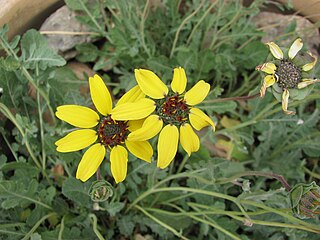
Berlandiera is a genus of flowering plants in the family Asteraceae.

Artemisia bigelovii is a North American species of sagebrush known by the common name Bigelow sagebrush or flat sagebrush. It grows in the deserts of the southwestern United States.
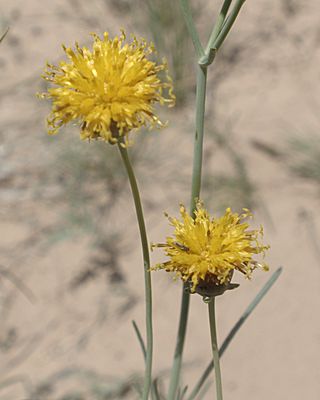
Thelesperma megapotamicum is a perennial, herbaceous, flowering plant in the Asteraceae family native to sections of the Americas. It is known by the common names Hopi tea greenthread, rayless greenthread, Navajo tea, cota, and greenthread.

Bidens aristosa, known by many common names such as bearded beggarticks, western tickseed, showy tickseed, long-bracted beggarticks, tickseed beggarticks, swamp marigold, and Yankee lice, is an herbaceous, annual plant in the Asteraceae family. It is native to the central United States, but has been introduced to the eastern United States, Canada, France, Great Britain, and India. It grows in marshes, meadows, pine forests and disturbed sites.

Cosmos parviflorus, commonly known as the southwestern cosmos, is an annual, herbaceous, flowering plant in the Asteraceae family. It is native to parts of the Southwestern United States and most of Mexico and appears to be introduced in portions of the Northeastern United States.
Aphanostephus pilosus, the hairy lazydaisy, is an annual herbaceous flowering plant in the family Asteraceae. It is found in the United States.
Baccharis bigelovii is a North American species of shrubs in the family Asteraceae known by the common name Bigelow's false willow. It is found in the Chihuahuan Desert and nearby regions of the United States and Mexico, in the States of Chihuahua, Durango, Sonora, Arizona, New Mexico, and Texas.
Bahia bigelovii, or Bigelow's bahia, is a North American species of flowering plants in the family Asteraceae. It is native to the State of Coahuila in Mexico and to the western (trans-Pecos) part of the US state of Texas.
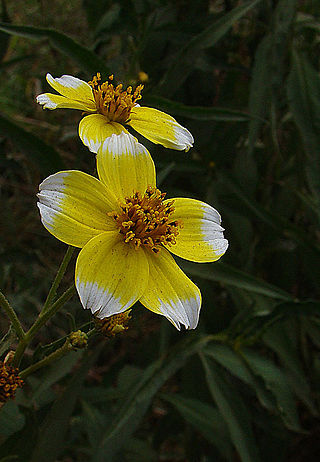
Bidens aurea , the Arizona beggarticks, is a North American species of flowering plant in the family Asteraceae. It is widespread across much of Mexico and found also in Arizona and Guatemala. The species is also naturalized in parts of Europe and South America.

Bidens bidentoides, commonly called swamp beggar's-ticks and delmarva beggarticks, is an annual, herbaceous, flowering plant in the Asteraceae family. It is native to the northeastern and east-central parts of the United States, the coastal plain of the States of Maryland, Delaware, Pennsylvania, and New Jersey plus the region around the Hudson River estuary in New York.
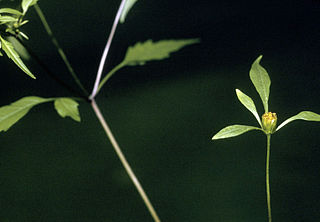
Bidens discoidea, commonly known as small beggarticks, is an annual, herbaceous, flowering plant in the Asteraceae family. It is widespread across eastern Canada and the eastern and central United States, from Nova Scotia west to Minnesota, south to Florida and Texas.
Bidens heterosperma, commonly known as the Rocky Mountain beggarticks, is an annual or perennial, herbaceous, flowering plant in the family Asteraceae, tribe Coreopsideae. It is native to northwestern and north-central Mexico, and portions of the southwestern United States.
Bidens lemmonii is a North American species of flowering plant in the family Asteraceae. It is native to the southwestern United States and Mexico.
Bidens leptocephala, commonly known as the fewflower beggarticks, is an annual herbaceous flowering plant in the Asteraceae family. It is native to the southwestern United States and northern Mexico.
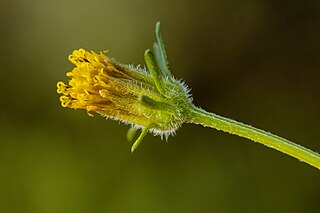
Bidens tenuisecta , the slim lobe beggarticks, is a North American species of flowering plant in the family Asteraceae. It is native to northern Mexico (Chihuahua) and the western United States. There are also reports of populations in the northeastern United States but these are almost assuredly introductions.

Carphochaete bigelovii, common name Bigelow's bristlehead, is a species of North American flowering plants in the family Asteraceae. They are native to northern Mexico and the southwestern United States.

Dieteria bigelovii, also known as Bigelow's tansyaster or sticky aster, is a North American species of plants in the family Asteraceae.

Thelesperma simplicifolium, commonly known as the slender greenthread, is a perennial, herbaceous, flowering plant in the Asteraceae family. It is found from Texas and Mexico in openings in oak or juniper woodlands or on desert scrub.















